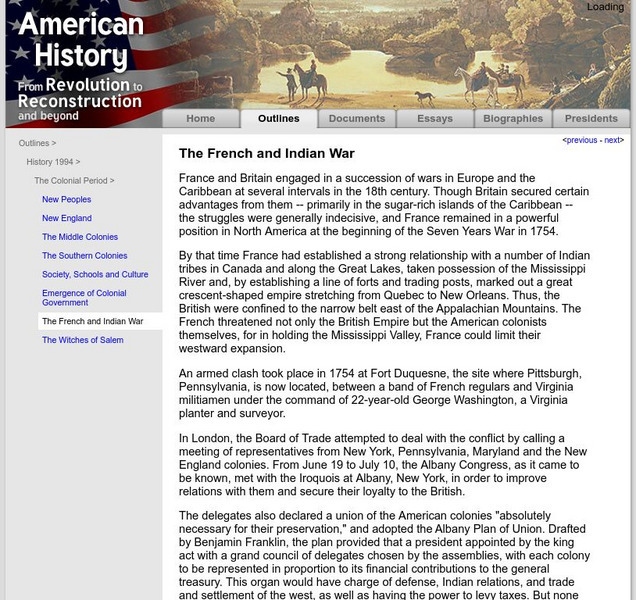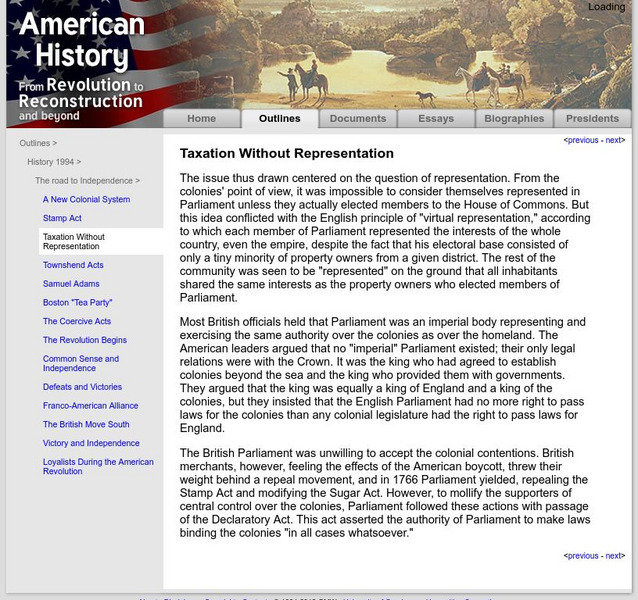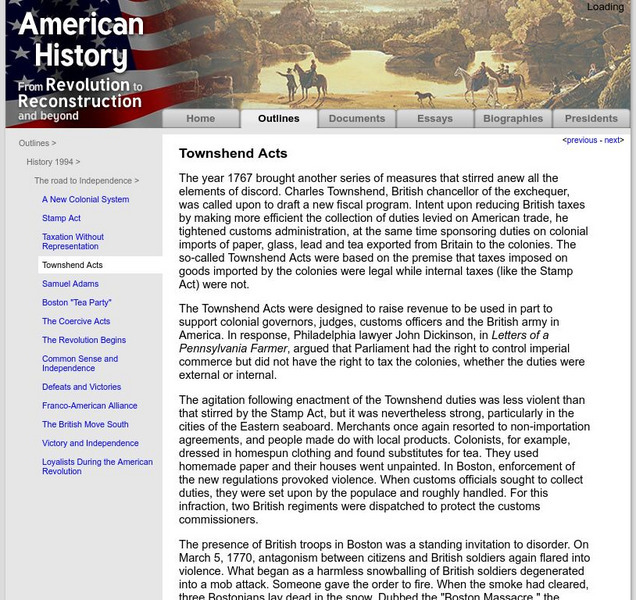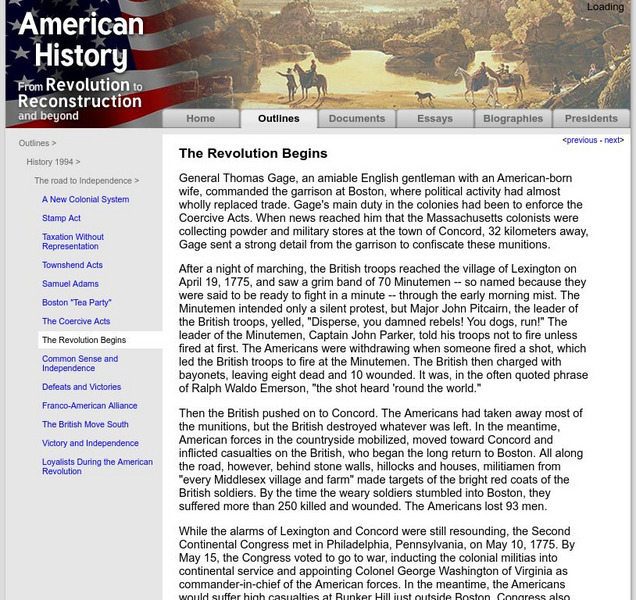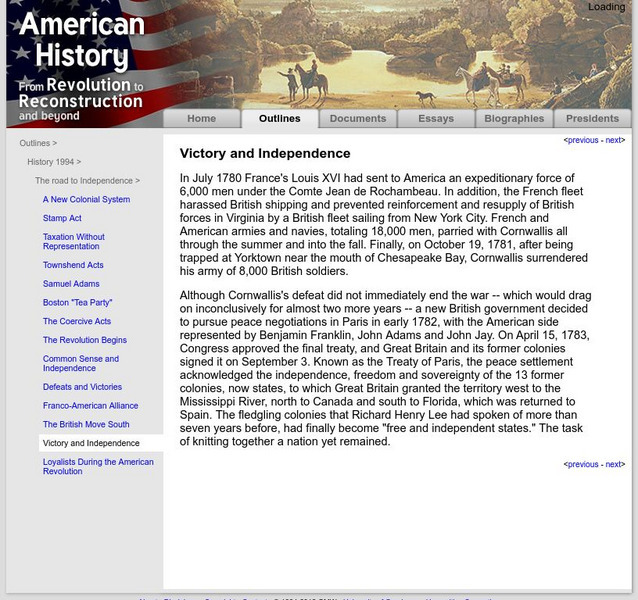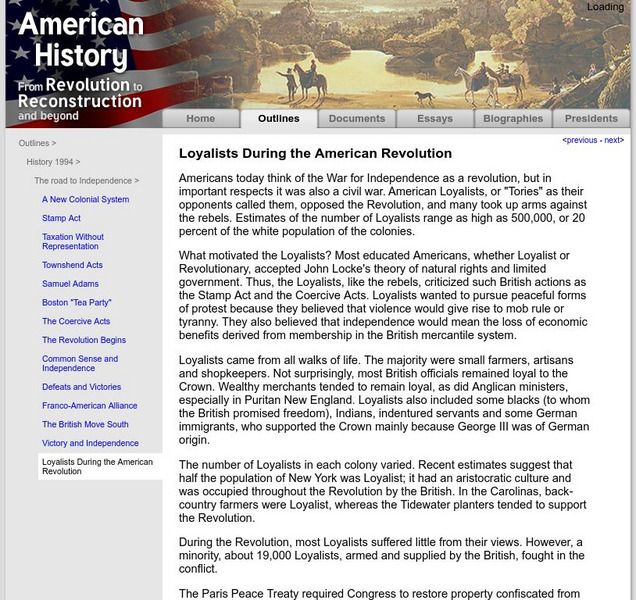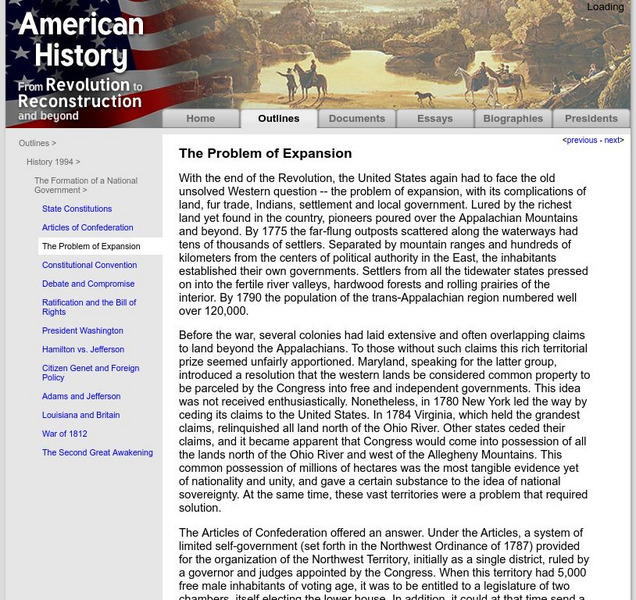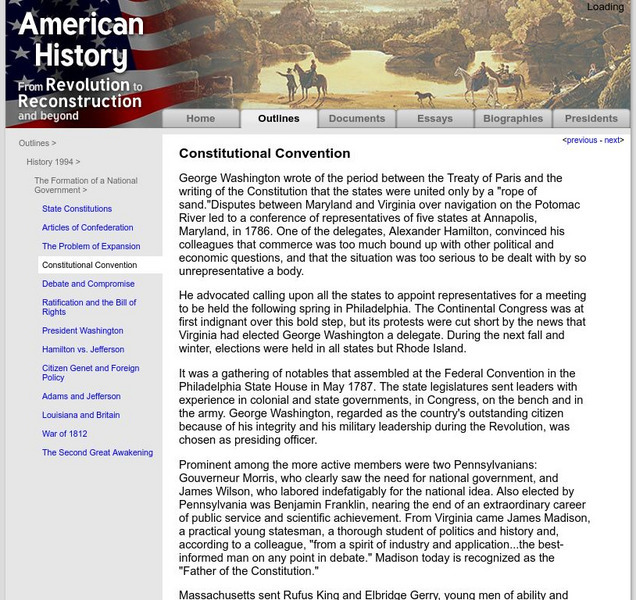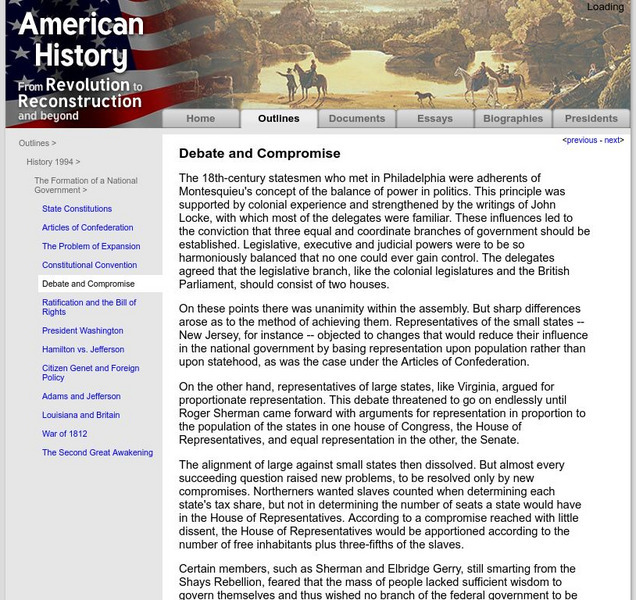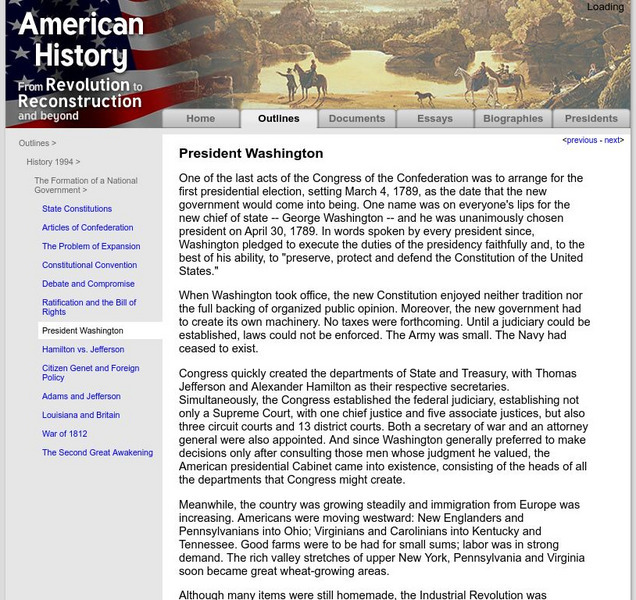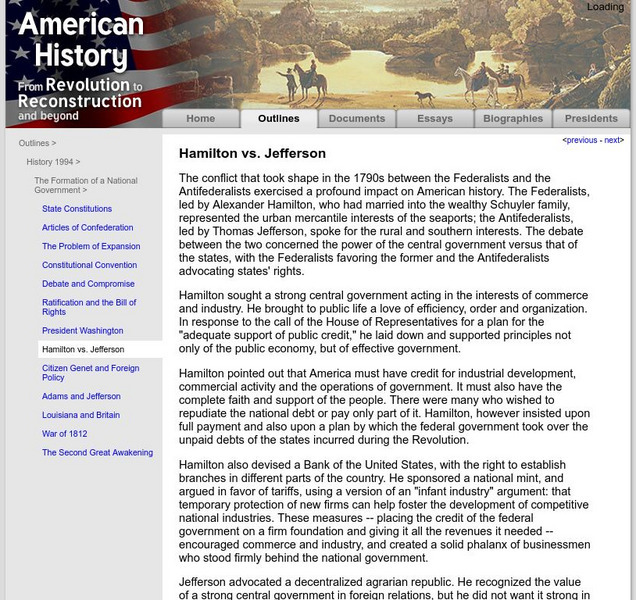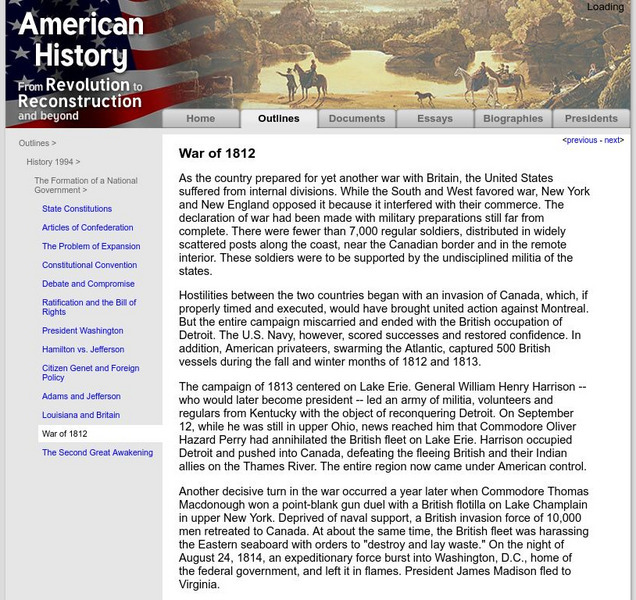University of Groningen
American History: Outlines: The Middle Colonies
Society in the middle colonies was far more varied, cosmopolitan and tolerant than in New England. In many ways, Pennsylvania and Delaware owed their initial success to William Penn.
University of Groningen
American History: Outlines: Southern Colonies
In contrast to New England and the middle colonies were the predominantly rural southern settlements: Virginia, Maryland, North and South Carolina, and Georgia.
University of Groningen
American History: Outlines: The French and Indian War
France and Britain engaged in a succession of wars in Europe and the Caribbean at several intervals in the 18th century. Though Britain secured certain advantages from them -- primarily in the sugar-rich islands of the Caribbean -- the...
University of Groningen
American History: Outlines: The Witches of Salem
In 1692 a group of adolescent girls in Salem Village, Massachusetts, became subject to strange fits after hearing tales told by a West Indian slave. When they were questioned, they accused several women of being witches who were...
University of Groningen
American History: Outlines: A New Colonial System
Although some believe that the history of the American Revolution began long before the first shots were fired in 1775, England and America did not begin an overt parting of the ways until 1763, more than a century and a half after the...
University of Groningen
American History: Outlines: Taxation Without Representation
The issue thus drawn centered on the question of representation. From the colonies' point of view, it was impossible to consider themselves represented in Parliament unless they actually elected members to the House of Commons. But this...
University of Groningen
American History: Outlines: Townshend Acts
The year 1767 brought another series of measures that stirred anew all the elements of discord. Charles Townshend, British chancellor of the exchequer, was called upon to draft a new fiscal program. Intent upon reducing British taxes by...
University of Groningen
American History: Outlines: Boston "Tea Party"
In 1773, however, Britain furnished Adams and his allies with an incendiary issue. The powerful East India Company, finding itself in critical financial straits, appealed to the British government, which granted it a monopoly on all tea...
University of Groningen
American History: Outlines: The Revolution Begins
General Thomas Gage, an amiable English gentleman with an American-born wife, commanded the garrison at Boston, where political activity had almost wholly replaced trade. Gage's main duty in the colonies had been to enforce the Coercive...
University of Groningen
American History: Outlines: Defeats and Victories
Although the Americans suffered severe setbacks for months after independence was declared, their tenacity and perseverance eventually paid off. During August 1776, in the Battle of Long Island in New York, Washington's position became...
University of Groningen
American History: Outlines: Franco American Alliance
In France, enthusiasm for the American cause was high: the French intellectual world was itself in revolt against feudalism and privilege. However, the Crown lent its support to the colonies for geopolitical rather than ideological...
University of Groningen
American History: Outlines: The British Move South
With the French now involved, the British stepped up their efforts in the southern colonies since they felt that most Southerners were Loyalists. A campaign began in late 1778, with the capture of Savannah, Georgia. Shortly thereafter,...
University of Groningen
American History: Outlines: Victory and Independence
In July 1780 France's Louis XVI had sent to America an expeditionary force of 6,000 men under the Comte Jean de Rochambeau. In addition, the French fleet harassed British shipping and prevented reinforcement and resupply of British...
University of Groningen
American History: Outlines: Loyalists During the American Revolution
Americans today think of the War for Independence as a revolution, but in important respects it was also a civil war. American Loyalists, or "Tories" as their opponents called them, opposed the Revolution, and many took up arms against...
University of Groningen
American History: Outlines: State Constitutions
The success of the Revolution gave Americans the opportunity to give legal form to their ideals as expressed in the Declaration of Independence, and to remedy some of their grievances through state constitutions. As early as May 10,...
University of Groningen
American History: Outlines: The Problem of Expansion
With the end of the Revolution, the United States again had to face the old unsolved Western question -- the problem of expansion, with its complications of land, fur trade, Indians, settlement and local government. Lured by the richest...
University of Groningen
American History: Outlines: Constitutional Convention
George Washington wrote of the period between the Treaty of Paris and the writing of the Constitution that the states were united only by a "rope of sand."Disputes between Maryland and Virginia over navigation on the Potomac River led to...
University of Groningen
American History: Outlines: Debate and Compromise
The 18th-century statesmen who met in Philadelphia were adherents of Montesquieu's concept of the balance of power in politics. This principle was supported by colonial experience and strengthened by the writings of John Locke, with...
University of Groningen
American History: Outlines: President Washington
One of the last acts of the Congress of the Confederation was to arrange for the first presidential election, setting March 4, 1789, as the date that the new government would come into being. One name was on everyone's lips for the new...
University of Groningen
American History: Outlines: Hamilton vs. Jefferson
The conflict that took shape in the 1790s between the Federalists and the Antifederalists exercised a profound impact on American history. The Federalists, led by Alexander Hamilton, who had married into the wealthy Schuyler family,...
University of Groningen
American History: Outlines: Adams and Jefferson
Washington retired in 1797, firmly declining to serve for more than eight years as the nation's head. His vice president, John Adams of Massachusetts, was elected the new president. Even before he entered the presidency, Adams had...
University of Groningen
American History: Outlines: Louisiana and Britain
One of Jefferson's acts doubled the area of the country. At the end of the Seven Years' War, France had ceded to Spain the territory west of the Mississippi River, with the port of New Orleans near its mouth -- a port indispensable for...
University of Groningen
American History: Outlines: War of 1812
As the country prepared for yet another war with Britain, the United States suffered from internal divisions. While the South and West favored war, New York and New England opposed it because it interfered with their commerce. The...
University of Groningen
American History: Biographies: George Herbert Walker Bush (1924 )
America's 41st President, George Bush, was born on June 12, 1924, in Milton, Massachusetts, into a wealthy family as George Herbert Walker Bush.




